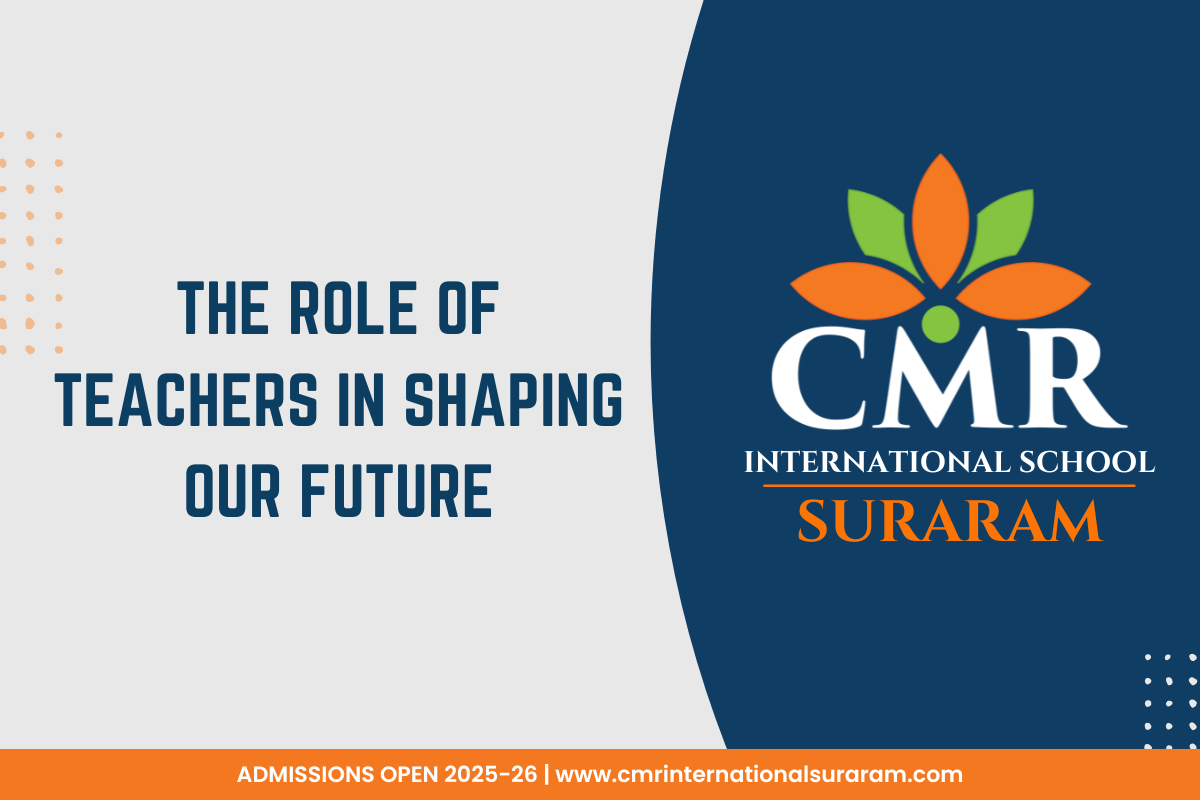Introduction
When we think about our future, one group of people consistently stands out—teachers. They are more than just instructors who explain lessons in classrooms; they are guides, mentors, motivators, and role models. Teachers shape not only what we know but also who we become. At CMR International School (CMRIS), the role of teachers goes far beyond textbooks—they prepare students for life, equipping them with values, skills, and confidence to face tomorrow’s challenges.
Isn’t it true that most of us remember at least one teacher who left a lasting mark on our lives? That’s the power teachers carry. Let’s explore how teachers shape our future, and why their contribution is vital for society.
1. Teachers as Architects of Knowledge
Teachers are often compared to architects, but instead of building structures, they build minds. At CMRIS, teachers create a strong foundation by teaching core subjects while also encouraging curiosity and a love for learning. Just like a well-designed building lasts for centuries, the knowledge imparted by teachers stays with students for life.
2. The Emotional Bond Between Teachers and Students
Learning is not just about academics—it’s also about relationships. Teachers at CMRIS form strong bonds with their students, offering support, encouragement, and guidance. This emotional connection helps students feel safe, valued, and motivated to learn.
3. Teaching Beyond the Textbook
A textbook may explain facts, but teachers bring those facts to life. Whether through storytelling, real-life examples, or hands-on projects, CMRIS teachers make learning meaningful and practical. This helps students understand concepts deeply instead of memorizing them.
4. The Role of Teachers in Character Building
What good is knowledge without values? Teachers instill discipline, honesty, empathy, and perseverance in their students. At CMRIS, character education is a core part of the learning journey, ensuring students grow into responsible human beings.
5. Teachers as Lifelong Mentors
A teacher’s role doesn’t end when the school bell rings. They continue to inspire and guide students even after graduation. Many CMRIS alumni credit their success to teachers who believed in them during their formative years.
6. Fostering Creativity and Innovation
Teachers encourage students to think outside the box. At CMRIS, teachers promote innovation through activities like debates, projects, art, and robotics labs. This creativity prepares students for future careers where problem-solving and originality are essential.
7. Preparing Students for Real-World Challenges
The world outside the classroom is full of challenges. Teachers prepare students by teaching life skills such as teamwork, communication, decision-making, and resilience. These skills are as important as academic achievements in shaping a successful future.
8. Teachers as Role Models in Society
Students often look up to teachers as examples of how to live, behave, and lead. By displaying patience, kindness, and integrity, teachers set standards for the next generation. At CMRIS, teachers embody these values daily, showing that learning extends beyond books.
9. Building Confidence and Self-Esteem
Confidence is the key to success. Teachers nurture this by recognizing each student’s strengths, celebrating achievements, and helping overcome weaknesses. At CMRIS, teachers create an environment where students believe in themselves.
10. The Importance of Teacher-Student Communication
Good communication between teachers and students builds trust. CMRIS teachers encourage open dialogue, where students feel comfortable sharing ideas, asking questions, and even expressing doubts without fear of judgment.
11. Embracing Technology in Education
In today’s digital world, teachers must adapt. At CMRIS, teachers use smart classrooms, digital tools, and interactive learning platforms to make lessons engaging and relevant. Technology allows teachers to prepare students for the modern workplace.
12. Teachers and the Development of Critical Thinking
Teachers challenge students to analyze, evaluate, and think independently rather than blindly accepting information. This critical thinking helps students make informed decisions in their personal and professional lives.
13. The Role of Teachers in Shaping Responsible Citizens
Education is not just about careers—it’s about building a better society. Teachers instill civic responsibility, social awareness, and environmental consciousness. At CMRIS, students are encouraged to participate in community initiatives, showing that learning also means giving back.
14. How CMRIS Empowers Teachers to Make a Difference
CMRIS provides teachers with resources, training, and opportunities for professional growth. This support ensures that teachers remain motivated, updated, and effective in shaping the future of students. The school’s vision emphasizes that when teachers thrive, students succeed.
15. Conclusion
Teachers are more than educators—they are dream-builders, mentors, and nation-shapers. At CMRIS, their influence goes beyond classrooms, shaping not just the future of students but the future of society. Just as a potter molds clay into beautiful forms, teachers mold young minds into future leaders, innovators, and responsible citizens.
So the next time you think about the future, remember—it is teachers who hold the blueprint.
FAQs
1. Why are teachers called nation-builders?
Teachers shape the character, skills, and values of students who become future leaders, contributing to the nation’s growth.
2. How do teachers influence students beyond academics?
They act as mentors, instill values, boost confidence, and help students navigate life challenges.
3. What makes teachers at CMRIS unique?
CMRIS teachers focus on holistic development, using modern teaching methods while nurturing character and creativity.
4. How do teachers prepare students for real-life challenges?
By teaching life skills such as problem-solving, communication, and resilience alongside academics.
5. How does CMRIS support its teachers?
The school invests in teacher training, resources, and continuous professional development to empower them to be effective mentors.

